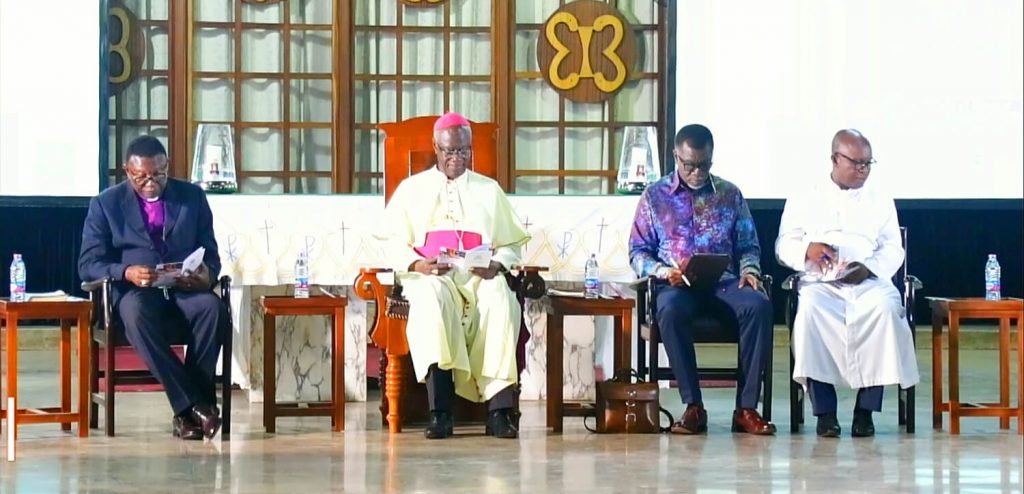
BEING A CHRISTIAN IN GHANA TODAY: IN PREPARATION FOR CHRISTMAS
+ John Bonaventure Kwofie, CSSp
Conversations, by their very nature, are light. They come from the heart. Those who have spoken before me have shared some thoughts worth our attention. I wish to add two more points to enliven our conversation. The first is our Christian responsibility towards the poor and needy and the second is about the craze for prophetic utterances in our country.
- Christ Teaches us about Solidarity between the Rich and Poor
In Ghana today, an erroneous religious Christian culture is under construction. Our television screens and air waves are gradually painting the picture that the Christ-event was all about healing the sick and chasing away demons. The importance of these notwithstanding, Jesus was also interested in the poor of the land. He was interested in those excluded by the socio-economic system and have become the oppressed and neglected of society. He was interested in beggars and even those who made their livelihood by means of prostitution. Jesus was interested in families who struggled to meet the barest minimum of resources for their survival. He was interested in those who lived on the crumbs that fell from the table of the rich and powerful.
I wish to use the parable of Lazarus lying at the gate of the rich man in the Gospel (Lk 16:19-31) and the parable of hoarding possession in Lk 12:16-21 to call the attention of Christians to the situation of the poor and excluded in our society and our Christian call to live in solidarity with the needy by a life of sharing.
“There was once a rich man who having had a good harvest from his land thought to himself, “What am I to do? I have no enough room to store my crops”. Then he said, “This is what I will do, “I will pull down my barns and build bigger ones … then I will say to my soul, “My soul, you have plenty of good things laid by for many years to come: take things easy, eat, drink, have good time …” (Lk 12: 16-21)
“There was a rich man who was dressed in purple and fine linen and lived in luxury every day. At his gate was laid a beggar named Lazarus covered with sores and longing to eat what fell from the rich man’s table. Even the dogs came and licked his sores …” (Lk 16:19-31)
The parable of the rich man and Lazarus challenges every Christian to question ourselves of our attitude towards the poor, neglected, abandoned, forgotten and excluded. We meet “Lazarus” daily in the poor who knock at our door or wait at the gates of our homes hoping to satisfy their hunger from the crumbs that fall from the table of the rich. With this story, Jesus opens our eyes to recognize the gap between those who live in crazy affluence and others who live in abject poverty poor with no or very little food to eat and no money to buy medication to treat their illnesses or dress their wounds. This gap is sometimes created by greed and fuelled by injustice.
The life of the rich is a failure when they bury their heads in the sand and pretend not to see the anguish of the poor and dejected. The life of the rich is foolishness when they make their wealth by impoverishing the ignorant and unsuspecting and turn a blind eye to the suffering they inflict on others. Running after and holding wealth in excess can make the actors ruthless and insensitive. They do not ask “what shall we do to ease the pain of others or ameliorate the conditions of others”? They rather desire to build bigger storehouses so that they can accumulate more riches by making others poorer (cf. Lk 12:18). When the rich reach this stage, they have certainly lost Christ in the equation. Christianity teaches that we cannot tell ourselves, “relax, eat, drink and have merry” when a portion of the population has no food to eat and no place to lay their heads. Being wealthy is a blessing to be shared with the have-nots. Christianity teaches about sharing and solidarity for “if one member suffers, all suffer together, if one member is honoured, all rejoice together” (1 Cor 12:26).
Let’s listen to what St. Basil the Great said, “When someone steals another’s clothes, we call them a thief. Should we not give the same name to one who could clothe the naked and does not? The bread in your cupboard belongs to the hungry; the coat unused in your closet belongs to the one who needs it; the shoes rotting in your closet belongs to the one who has no shoes; the money which you hoard up belongs to the poor”
Christian religion is not only about running after miracles but also going to the help of the poor and abandoned in our midst. Can we be Christians and behave like the rich man in the Gospel who closed his eyes on the poor? Can we be Christians and accumulate wealth by impoverishing others? Can we be Christians and treat others or even the environment unjustly for the sake of amassing wealth for ourselves? A well-formed Christian conscience has much to teach us.
- Christians in Ghana and the Craze for Prophetic Utterances
Some Christians today desire to go to pastors who make what they call prophetic utterances on their lives. Looking for economic gain and solutions to health and other personal issues and gain, people have become religiously gullible and have fallen prey to predators who present themselves as pastors of churches. They claim access to visions and subjective prophecies and have the key to open heaven’s ATM machine. We have reached the point when some Christians inquire from their friends whether their pastors prophesy on the destinies of the faithful in order to gain commendation for being the Church to attend. Some so-called Men of God, therefore, take advantage of the ignorance of our Christians who come to them seeking direction for their lives by making pronouncements in the name of prophecies. Some of these self-styled prophets have ruined families and the lives of people with their irresponsible teachings and prophecies often for sordid gain.
Some of our Christians think that the work of the prophet is to predict the future and direct the destinies of people. They fail to realize that a prophet is one who speaks for or on behalf of God about the present and their consequences for the future. This is what the OT prophets largely did. They were the voice of God concerning present matters or events and their consequences for the future. They pointed out breaches and behaviours that went against their relationship with the God of the Covenant and the punishment or judgement that laid in the future should they not change their ways. The prophetic books give witness to this.
It is required of us Christians to understand prophecy as “a way of being in the world”, a style of life that speaks of and for God. The prophet speaks God’s words in human words because he sees the human situation from God’s perspective (Timothy Johnson). This is the essence of the prophetic formula employed by the prophets; for example, “The word of God which came to Hosea” (Hos 1:1), “Listen Israelites to this prophecy which Yahweh pronounces against you, against the whole family which I brought up from Egypt” (Amos 3:1), “Hear what Yahweh says” (Isa 1:10), “The word of God was addressed to me” (Ezek 6:1), etc. This made prophetic utterances special. They spoke authoritatively of what God expected from the people of Israel and the consequences should they fail to respond to God’s word.
True prophecy, therefore, was always on the side of the truth. The prophet stood in defence of the Covenant at all time without counting the cost. They spoke against idolatrous practices, hypocrisy in the service of Yahweh, injustice in its various kinds, economic exploitation, disregard for the poor of the land, etc. For example, Prophet Nathan promised David of a throne that will remain forever (2 Sam 7:1-16) but when David sinned with Bathsheba, Nathan chastised him and requested his repentance. Elijah the Tishbite challenged Ahab the king of Israel when he wanted to illegally possess Naboth’s vineyard (1 Kgs 21:17-19). Micaiah didn’t join the band of false prophets who prophesized to please Ahab and so was imprisoned for telling the truth (1 Kgs 22:9-28). Despite the threat of death, Elijah stood on the word of God and denounced King Ahaziah for consulting Baal-Zebub, the god of Ekron (2 Kgs 1:1-15). Jeremiah’s scrolls were torn into pieces and thrown into a brazen fire and was himself arrested and beaten and put into an put into an underground vault for a long time (Jer 36:1-37:16). We lack such men of courage today.
This brings us to another consideration, Christianity as prophetic witness. “False prophets” have been part and parcel of religious practices. Jesus himself warned his followers against “false prophets”. He said they come disguised as sheep but underneath are ravenous wolves who can be identified by their fruits or way of life (cf. Mt 7:15-16). There were also self-appointed prophets and false teachers in the nascent and early church who were unsettling the minds of the early believers. Paul, in his pastoral letters to Timothy and Titus, warned them and their loyal followers to beware of such people (see 1 Tim 4:1-16; 2 Tim 2:14-21; Ti 1:10-15).
The Christ who comes to us at Christmas calls us to give authentic witness of our Christian faith. Unfortunately, our society adores false witnessing because those who seek to live righteous lives end up being ridiculed, denounced or persecuted by their own people. A certain acceptance is building up of insidious characters who enter into public services to amass wealth for themselves to the detriment of the facility. What is the life of the Christian if it is not for authentic witnessing? This is what the Risen Lord commanded his followers to do in the power of the Holy Spirit: You will receive the power of the Holy Spirit and then you shall be my witnesses to the whole world (cf. Acts 1:8)! Jesus had said this before in another way to his disciples: You are the salt of the earth and the light of the world (cf. Mt 5:13-16). He forewarned his disciples: people will abuse you and persecute you and speak all kinds of calumny against you falsely on account of me, but don’t give up, rejoice because your faithfulness will reward you with blessedness (Mt 5:11-12). This is what Christ demanded from his disciples when he said, “The kingdom of Heaven is like a leaven a woman took and mixed in with three measures of flour till it was leavened all through (cf. Mt 13:33). Christians act as leaven of society. The Lord always encourages the Ghanaian Christian to stand up in defence of the truth as he told Paul in a vision, “Courage! You have borne witness for me in Jerusalem, now you must do the same in Rome” (Acts 23:11).
Indeed, the prophet is one who bears witness to God in their relationship with humans in season and out of season. Prophecy and therefore authentic witnessing. Witnessing of this kind is certainly more than merely speaking about God. It involves making personal sacrifices because we are people who are convinced of what our faith teaches us. But how can we witness if we lack that personal conviction of faith, the type that will make us sell all we have to acquire that precious gem called faith? How can we witness when we lack that personal conviction, the type that led people to face martyrdom courageously because they would not compromise their faith with idolatry and other practices that were inconsistent with their faith? We see such faith and conviction in the Books of Maccabees and Daniel and in the history of martyrs of the Church. May our celebration of Christmas be an occasion of renewal of our faith in the Word that took flesh and dwelt amongst us (Jn 1:14).

